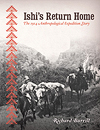
Ishi’s Return Home: The 1914 Anthropological Expedition Story, by Richard Burrill, The Anthro Co., an imprint of Paragon Publishing, Red Bluff, Calif., 2014, $29.95
On August 28, 1911, a hungry, sad and frightened Yahi Indian emerged from the wilds of California to the outskirts of Oroville and created a sensation, having lived in seclusion for some 35 years. Known at first as the “Wild Man of Oroville,” he came to be known as Ishi, “Last of the Yahi.” Anthropologist Thomas T. Waterman brought Ishi to Berkeley, where the Yahi survivor lived at the University of California Museum of Anthropology until he died of tuberculosis on March 25, 1916. For details on Ishi’s background and his emergence into civilization, check out Richard Burrill’s earlier books Ishi’s Untold Story in His First World, Ishi in His Second World and Ishi Rediscovered. The author’s latest Ishi offering centers on May 1914, when Ishi led Waterman and fellow anthropologist Alfred Kroeber, along with friend Dr. Saxton Pope and 11-year-old son Saxton Pope Jr., on an expedition to Ishi’s ancestral territory in the Tehama County outback.
“The struggle for Ishi,” Burrill writes, “was how would he deal with the ghosts and demons of his past.…The anthropologists hoped to learn how California Indians lived and survived in precontact times.” One of the demons Ishi had to confront was the expedition’s packer, “One-Eyed Jack” Apperson, who in 1908 was a Vina rancher who helped discover and sack Ishi’s Yahi village. Burrill, who in 2002 established the annual Ishi Gathering and Seminar, details in words, 357 photos and 29 maps a 17-day adventure in Ishi country—paid for by the University of California, but for the travel costs of the two Popes. Along the way Ishi demonstrated his stone toolmaking ability, and the anthropologists documented his skills as a craftsman, fisherman and bow hunter. Ishi came to confide in Saxton Pope Jr., once telling the boy he “heard his family members calling him.” Whatever ghosts there were, Ishi seemed to deal with them just fine. “It was a happy time with Ishi in his element,” writes Burrill. The last of his people would never again return to his old haunts.
—Editor




